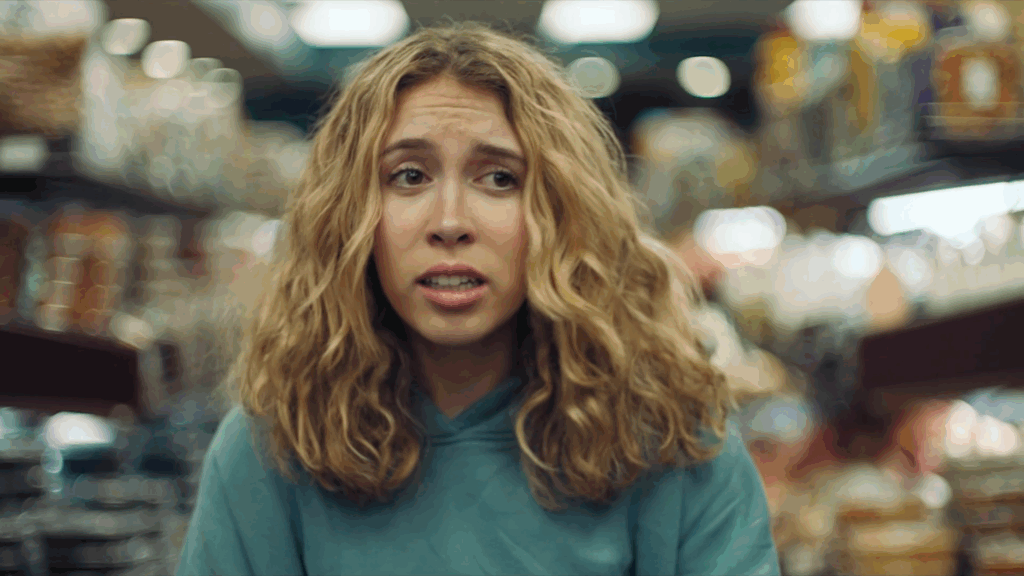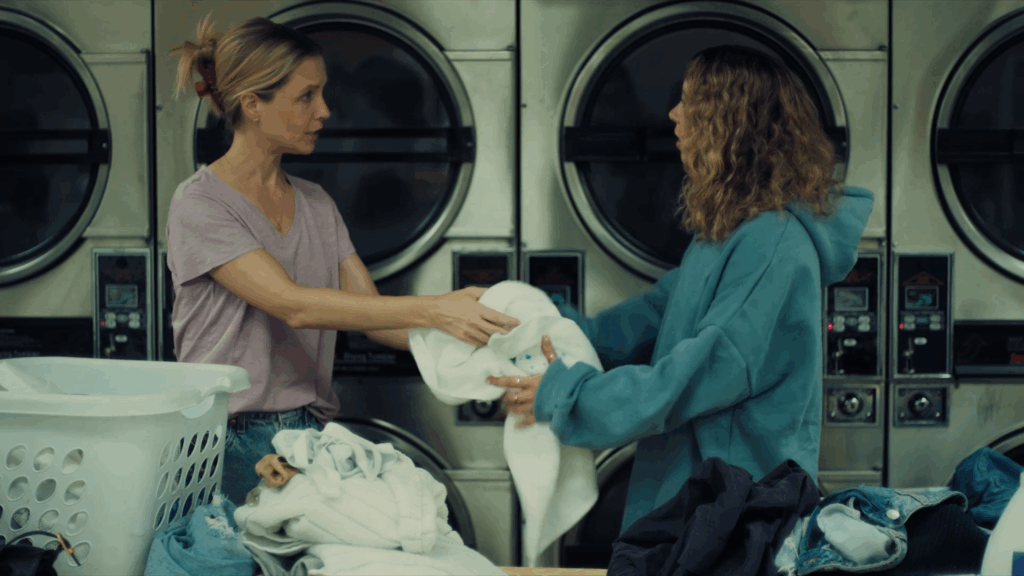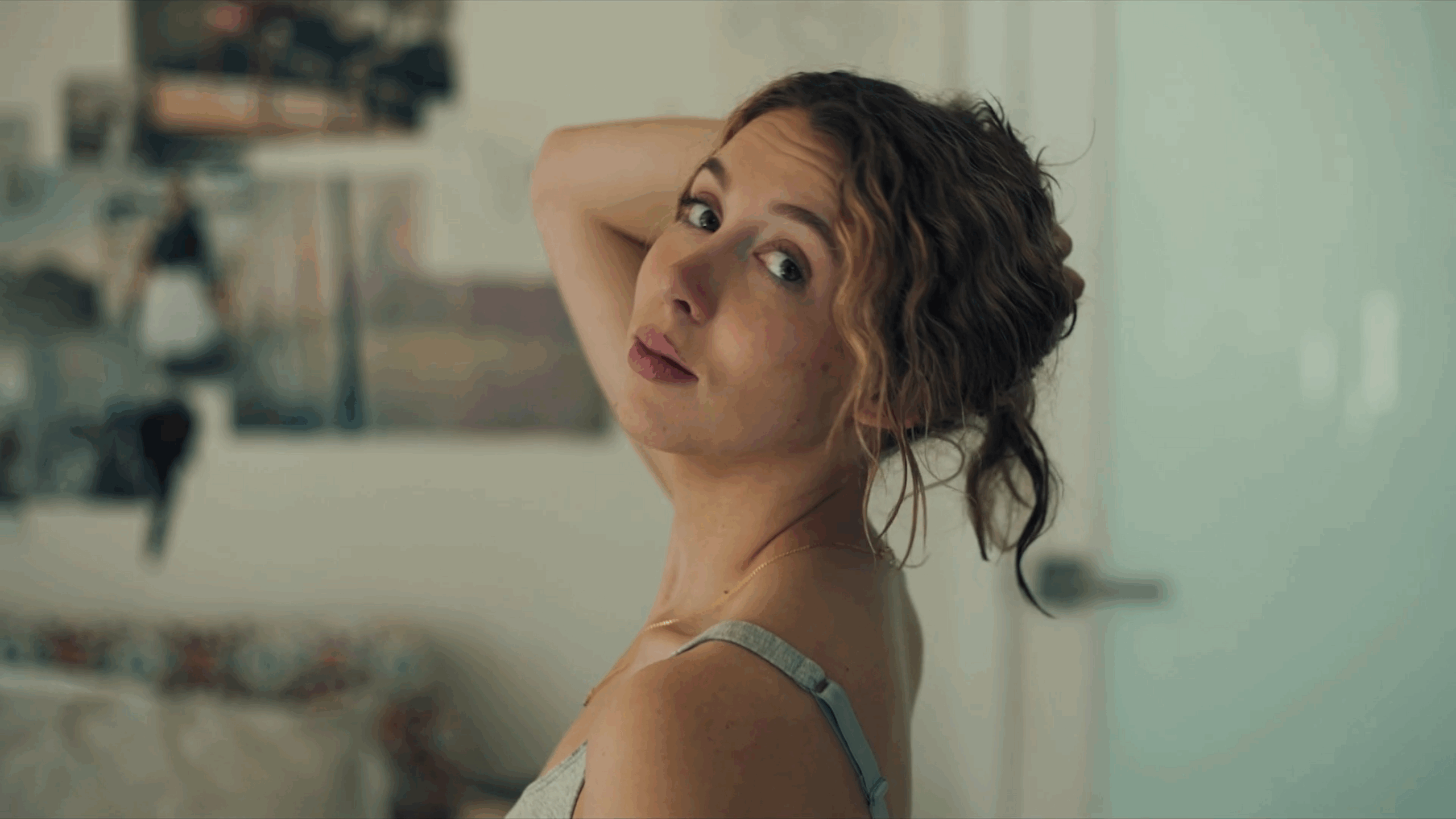“Popping your cherry,” “losing your V-card,” “getting deflowered” — the English language has a bunch of euphemisms for losing virginity. (And almost all of them are derogatory and ugly.) With Callie Carpinteri’s terrific short, we can add a new one: “dirtying the towel.”
The short is built around an evocative image: A mother (Laura Coover) tells her daughter Charlie (Emma Parks) that when she has sex, she becomes a dirty towel. Nobody is going to want you any more, she suggests — you are soiled, no longer usable for your purpose. So when a teenaged Charlie has sex with a coworker (Ben Krieger) — and it’s sex that makes her feel happy and fulfilled, at least for a moment — her mind starts to spiral from the aggressive shaming she’s felt growing up.

The message Charlie hears derives from her own mother’s shame and regrets, but it is also cultivated broadly. America was founded by Puritans, and an obsession with “purity” and aversion from sexual freedom has been a part of American culture since its inception. The consequences and sources of this are sprawling and still being felt: just this week NPR published an article examining some reasons why modern teens have a more broken image of sex than their parents and even grandparents did at their age.
Carpinteri’s short, co-written by star Emma Parks (Carpinteri’s cousin), does a terrific job of using visual storytelling to show how this confuses and damages Charlie. In telling the story of a mom and daughter, it speaks more broadly about the social pressures and shames around sex.
All of this might sound heavy or didactic, but what really makes Dirty Towel shine is its delicate and nimble tone. It finds a perfect balance between exploring its ideas with incisive drama and letting the scenario breathe with gentle and even funny moments.
The two strongest aspects of the short are the acting and the editing. Emma Parks in the lead is simply wonderful. That she helped write and craft the character is not a surprise, as her performance is perfectly in tune with the character, resulting in a very sharp and sympathetic portrait for Charlie. Per Carpinteri’s interview with Directors Notes, Parks partially improvised the film’s climactic monologue at a laundromat, and the result is touching and empowering. I’ll be on the lookout for Parks’ name in future projects for sure. Coover is great as well as Charlie’s mother Elizabeth, giving Charlie’s foil (arguably antagonist) some bite without losing the sense of a human, loving mother. Child actor Laurel Nail is charming in the small part of younger Charlie, bringing us into Charlie’s world in the film’s opening scene.

The editing by Jesi Rojas is quite good. In her Directors Notes interview, Carpinteri speaks of a close partnership in the editing process with Rojas, and I think it shows with pacing and cuts that really bring out the story. The camera holds steady and long during Charlie’s more vulnerable moments — the late monologue; a vulnerable gaze at her own body in the mirror — and cleverly disorients us at other moments, like an nervous, partially-hallucinated walk through grocery store aisles. The result is an engaging, flowing rhythm to the story.
I also want to shout out the original score by composer Rosalind Wong. The music uses percussion and flute (and not synthesized, but recorded by a team including flautist Juan Antonia Rivera and percussionist Trevor Dolce), and it sets the tone well. It’s very light at moments, almost unnoticeable, when the scenes need to breathe. But other moments are more score-forward, developing the emotionality and increasing a sense of anxiety during Charlie’s nervous grocery story walk.
The film’s sense of humor is mostly low-key teen awkwardness, but Carpinteri and her team bring a few laughs. The funniest moment is a stinger at the very end of the film: After Charlie essentially narrates the short’s lesson in the key climactic monologue — a creative decision risked being too on-the-nose ultimately works in letting Charlie verbalize her feelings, in my opinion. Charlie’s speech inflates the thematic heft of the story, and Elizabeth’s retort deflates it with punchline timing. I really like this as an ending, offering both emotional and comic payoff, plus intrigue at what comes next.

Carpinteri notes on her web site and the Directors Notes interview that she’d like to turn Dirty Towel into a feature, even saying she and Parks already have a full-length script written, and I’d love to see it: The short offers a fully realized scenario of a young woman confronting and accepting her complicated and compromised feelings towards sex, but also hints at a story that could cut deeper if given space to expand. Particularly, she notes the feature-length script offers a “coming of age” for Elizabeth in addition to Charlie, which sounds like a very promising direction.
As a culture, we may be a long way from having a healthy and open relationship to sexuality, but Callie Carpinteri and her talented team do a great job exploring and even mending that gap.
Dirty Towel (12 min) is directed and co-written by Callie Carpinteri. It screened during the 2024 Tribeca Festival. It is streaming on Vimeo and Film Shortage. Carpinteri is a filmmaker based in Los Angeles. You can find her web site here.
Crew credits include Emma Parks as co-writer, Emilee Ford as cinematographer, Bridget Perdomo as production designer, Jesi Rojas as editor, and Rosalind Wong as composer. Cast credits include Emma Parks as Charlie, Laura Coover as Elizabeth, Ben Krieger as Jack, and Laurel Nail as young Charlie. Shoutout to Carpinteri and her production team for employing women in several lead crew positions, and for using an intimacy coordinator and child acting coach to help promote a safe filming environment.
Dan Stalcup is the film critic for The New Cinephile and The Goods. Reach him at dan.stalcup@gmail.com.
